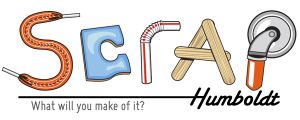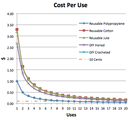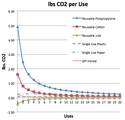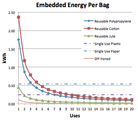
This is a research project in partnership between Engr308 Technology and the Environment and SCRAP Humboldt, during Fall 2012, to compare the impacts of single use plastic bags, paper bags, store bought reusable bags, and DIY reusable bags in Arcata, Humboldt County, California.
SCRAP is a 501(c)(3) nonprofit organization. Their mission is "to inspire creative reuse and environmentally sustainable behavior by providing educational programs and affordable materials to the community." Humboldt SCRAP is the fourth SCRAP in the US.
In Fall 2010, Engineering 308 partnered with the City of Arcata to research the impacts of single use plastic bags. The results at Arcata plastic bags helped to educate arguments over the merits of a single use plastic bag ban. This article gives more background.
Findings[edit | edit source]
This research on different grocery shopping bags is primarily compared on three metrics: cost, carbon dioxide emissions, and embedded energy. This research shows that single use paper bags have more embedded energy and offset more carbon dioxide than single use plastic bags. While the store-bought reusable bags tend to have high amounts of embedded energy and offset carbon dioxide, their additional structural integrity allows the bags to be used multiple times. After several uses, the reusable bags become more sustainable than the multiple single use bags that would be used otherwise.
Teams[edit | edit source]
Single use plastic bag team[edit | edit source]
Team: Sam Thall, Alex Aylward, Luke Wagner
Objective: The objective is to determine the energy, carbon, money and trash impacts of single use plastic bags.
Description:
Paper bag team[edit | edit source]
Team: Daniel Delgado, Dja10,Jonathan Baer, Greg Pfotenhauer
Objective: Find the embedded energy, CO2 emitted through all processes, the cost, and the energy cycle from cradle to grave of paper bags.
Description: Paper bags have been under much debate due to the fact that they are made out of a limited natural resource (trees) and because they are believed to have a large carbon footprint. Our research traced the life cycle of paper bags from the North Coast Coop, Wildberries Market, Rays Market, and Safeway. We compared the cradle to grave energy, carbon emissions, and cost to the consumer for paper bags from each store to understand if it is better to chooses paper or plastic at grocery stores.
Store bought reusable bag team[edit | edit source]
Team: Brian Woods, Holly Johnston, Daniel Jones, Lonny Grafman
Objective: Our group is focusing on the life cycle assessment of reusable shopping bags provided at grocery stores in Arcata. We will be measuring money, carbon, energy, and trash.
Description: Reusable store bought bags provide an alternative to using single use plastic bags every shopping trip. These bags are lightweight, compact, washable and available in most stores. Store bought bags come in many sizes and materials with some being very sturdy and long lasting and others less so. Our research compares the energy, CO2 emissions and water usage to produce cotton canvas, jute and polypropylene bags over their lifespan.
DIY reusable bag team[edit | edit source]
Team: Leo Astorga, Cheryl Hartman, Caelidh, James Hoover
Objective: The objective of our group is to determine the energy and trash impacts in the diversion of plastic bags from single use throw-outs into re-crafted multi-use bags.
Description:
Meta team[edit | edit source]
Team: Connie Low, Chet Jamgochian, David "Miles" Bloch
Objective: Our group's focus is to organize information collected by the other teams and design a sortable table that will produce specific information about the cost and energy expenses of our daily bag choices here in Arcata.
Research[edit | edit source]
Single use plastic bag research[edit | edit source]
Energy[edit | edit source]
- Some Dangers as well how many bags and how much oil it takes to produce this many plastic bags.
- Petroleum, coal, and natural gas for a single plastic bag.[1]
Carbon[edit | edit source]
- Amount of carbon per relevant fuel type.[2]
Cost[edit | edit source]
- "California taxpayers spend approximately $25 million every year to collect and landfill plastic bags."[3]
- Berkely proposed a plastic bag ban due to cost and impacts on the environment.[4]
- Ireland's bag tax cut plastic bag usage by 90%.[5]
- LA County bans plastic bags due to impacts on environment and to push for reusable cloth bags.[6]
Trash[edit | edit source]
- Impact of plastic bags. Only 1% of plastic bags are recycled worldwide.[7]
- "Americans only recycle 0.6 percent of the 100 billion plastic bags they take home from stores every year; the rest end up in landfills or as litter." Plastic bags may take between 10 and 100 years to decompose under UV radiation from the sun.[8]
- Improper disposal of plastic bags cause dangerous health risks to wildlife around the world. Australian and British accounts of incidents.[9]
Toxicity[edit | edit source]
- Legislation on PPM of cadmium, hexavalent chromium, lead, mercury.[10]
- Dioxin; one of the most dangerous chemicals known to scientists... AND IT IS IN PLASTIC BAGS![11]
Other[edit | edit source]
- This is a extremely controversial issue. There is even a petition wanting your signature to band single use plastic bags altogether in Humboldt County.[12]
- This is just a fun way to express and help spread the word on banning single use plastics.[13]
- A lengthy article showing the controversy plastic bags are causing.[14]
- There is a type of fungus that eats plastic.[15]
- The Ban for plastic bags is getting huge media attention and action is starting to take place. "The San Mateo County Board of Supervisors voted Tuesday to ban the free distribution of single-use carry-out bags at retail outlets."[16]
- A chart/worksheet showing the types of plastic bags, materials they are made of, and the ability to be recycled.[17]
Paper bag research[edit | edit source]
- Energy use during paper manufacturing[18]
- Recycling stats from the EPA[19]
- Paper bag recycling overview and statistics[20]
- Specs for Duro grocery bags[21]
- LCA of paper products from Argonne Nat Lab[22]
- LCA of paper products[23]
- Brief description of energy cost of paper bags[24]
- Carbon footprint of grocery store bags in China, India, and Hong Kong[25]
- Nitrogen fixation in the treatment of pulp and paper wastewaters[26]
- Reusable projects for paper bags[27]
- "Humboldt recyclables travel to Willits instead of normal trash stream that travels to Oregon. That considered the embedded energy and CO2 emissions of disposal will be lower than the normal trash stream" - Ryan Keenan, OSHA certified waste disposer
- "Each week I order 5 bundles of 300 units each (size 1/7 paper bag)to keep the store stocked"- Vincent Graves-Blandford, Manager of North Coast CO-OP
- An Exploratory Comparative Study on Eco-Impact of Paper and Plastic Bags[28]
- An Article about Paper vs. Plastic[29]* "I'm sorry, I can't share with you any information about bags from our store, that is private information, if you want to know you have to contact the corporate offices. It is up to them if they choose to share that information with you. Also, how do I know you are not a corporate spy from Costco?"- Store Manager of Safeway Arcata's response when asked if he could share how many bags they go through in a month.
Store bought reusable bag research[edit | edit source]
- A reusable bag study[30]
- A website with information on jute reusable bags[31]
- A life cycle analysis study on Jute vs plastic and paper bags.[32]
- A reusable bag study in China, Hong Kong, and India[33]
- Uncertainty and sensitivity in the Carbon footprint of shopping bags[34]
- Cradle to grave life cycle assessment of reusable bags[35]
- Process of reusable shopping bag manufacturing[36]
- Sourcing of reusable bags provided at Murphy's Markets is Bunzel Distribution[37]
- Process of cotton production in US[38]* Making acrylic, polyethylene and polypropylene textiles[39]* UK Environment Agency bag comparison analysis[40]* Case study on different grocery bags by the David Dunand Research Group at Northwestern University.[41]* Packaging for Co-op Cotton bags.[42]
DIY reusable bag research[edit | edit source]
Websites[edit | edit source]
- Sandra's projects are attempting to make something attractive with old grocery bags[43]
- Julie Edmond demonstrates how to fuse old grocery bags with an iron to make a reusable grocery bag[44]
- Recycled Plastic Bag Shell Purse[45]
- Plastic Tote Bag from Recycled Plastic Bags[46]
- Fusing Plastic Bags[47]
- Make a Basket out of Plastic Bags[48]
- How to Make Plarn (Plastic Yarn)[49]
- Plarn Market Bag -- Crochet[50]
- How to Make Plarn & Crochet an Eco-Friendly Tote Bag[51]
- Granny Squares Bag (Spanish)[52]
- Plarn Tote Bag -- Knitted[53]
- Plarn Knit Bag Pattern[54]
- Plastic Bag Weaving[55]
- Plarn Dresses, Hats, Bags, and more[56]
Peer Reviewed Articles[edit | edit source]
- Designing the Most Appropriate Thread to Be Produced in Developing Countries by Recycling HDPE Bags[57]
- The ecological footprint of plastic grocery bags[58]
- Ways to reuse your plastic bags[59]
- A patent for a reusable plastic bag[60]
Books[edit | edit source]
- Yeager, Jeff. Don't Throw That Away!: 1,001 Ways to Reuse Your Stuff. Random House Digital, Inc.[61]
- Southern, Sally. Sew Many Bags, Sew Little Time: Over 30 Simply Stylish Bags and Accessories.[62]
Interviews[edit | edit source]
- "Usually forget to bring my bag. I maybe use it about 60% of the time."
Meta research[edit | edit source]
- This table lists existing plastic bag programs and its location, year, summary of program type, brief results, and city size.[63]
- These links include other ways to follow the changes to plastic bag bans and programs:
- http://www.reusethisbag.com/reusable-bag-infographics/plastic-bag-bans-world.asp
- http://plasticbaglaws.org/
- http://web.archive.org/web/20131206194631/http://plasticbagbanreport.com/category/bans/
- http://www.bagmonster.com/track-the-movement
- http://www.surfrider.org/programs/entry/rise-above-plastics
- http://www.bagitmovie.com/links_info.html
- Email from Jennifer Savage (Works for surfrider and ocean conservancy here in Humboldt) I was trying to find a way to quantify the trash amounts ending up in the environment here in Humboldt:
"I checked with our cleanup person and she said:
"Not sure about the quantity but we definitely pick up several with every beach cleanup. It's hard to decipher if they are washing up and then blowing up into the dunes, or if people are dumping their trash on the beach. I'm sure it's a mixture of both. Also, we only have a small handful of volunteers, and we generally focus on the shoreline where we find more micro plastics, plastic bottles, and bottle caps mixed in with seaweed and driftwood."
There was a study done a couple years ago about how many plastic bags are used in Humboldt...."
Further Research[edit | edit source]
This research is focused on the comparison of the full lifespans of common grocery bag types based on three primary metrics: embedded energy, carbon dioxide emissions, and cost. While other comparative data is present, such as capacity and maximum number of uses, this research does not evaluate all of the environmental impacts and resource. Natural breakdown time, recyclability, and impact on wildlife are all critical aspects of a bag's effect on our environment. Some shopping bags also use water during production and manufacturing, but data on total water usage varies and attempted comparisons can be misleading. This research is also based entirely on shopping bags in Humboldt Bay, additional research and adjusting travel distances could provide different comparison results depending on the geographic location. This research does not cover every type of shopping bag available, let alone alternatives to using bags.
References[edit | edit source]
- ↑ http://web.archive.org/web/20150919210402/https://stuff.mit.edu/afs/athena/course/3/3.a30/www/refs/Institute%20for%20Lifecycle%20Environmental%20Assessment.pdf
- ↑ <http://web.archive.org/web/20150212152419/https://bioenergy.ornl.gov/papers/misc/energy_conv.html
- ↑ www.savesfbay.org/sites/default/files/MythvFact_bags_final.pdf
- ↑ http://www.ecologycenter.org/alerts/bagban/
- ↑ http://news.bbc.co.uk/2/hi/europe/2205419.stm
- ↑ http://articles.latimes.com/2010/nov/17/local/la-me-plastic-bags-20101117
- ↑ http://www.salon.com/2007/08/10/plastic_bags/
- ↑ http://business-ethics.com/2010/09/17/4918-plastic-grocery-bags-how-long-until-they-decompose/
- ↑ http://web.archive.org/web/20160304204436/http://plasticbags.planetark.org:80/about/wildlife.cfm
- ↑ http://web.archive.org/web/20150126195812/http://www.toxicsinpackaging.org:80/comparative_analysis.html
- ↑ http://www.ejnet.org/dioxin/
- ↑ http://www.humboldtbaykeeper.org/plastic-bag-ban/67-plastic-bag-ban-news/541-ban-single-use-plastic-bags-in-humboldt-county.html
- ↑ http://www.youtube.com/watch?v=koETnR0NgLY
- ↑ http://www.northcoastjournal.com/news/2012/10/11/bag-bag/5/
- ↑ http://www.techhive.com/article/249216/yale_discovers_a_fungus_that_eats_plastic.html
- ↑ http://www.hmbreview.com/news/bye-bye-plastic-bags/article_84d09fc2-1fae-11e2-a233-0019bb2963f4.html
- ↑ http://www.plasticbagrecycling.org/02.0/Worksheet1.pdf
- ↑ http://www1.eere.energy.gov/manufacturing/industries_technologies/forest/pdfs/doe_bandwidth.pdf
- ↑ http://web.archive.org/web/20070912025805/http://www.epa.gov/epaoswer/non-hw/muncpl/pubs/ex-sum05.pdf
- ↑ http://www4.ncsu.edu/~richardv/documents/Presentation108HOdetailedpart1best.pdf
- ↑ http://www.durobag.com/Standard/Products.aspx?p=12&f=1
- ↑ http://web.archive.org/web/20060908003353/http://msl1.mit.edu/pdfs/fed_docs/204215.pdf
- ↑ http://www.nap.edu/openbook.php?record_id=5734&page=54
- ↑ Zimring, Carl A., and William L. Rathje. Encyclopedia of Consumption and Waste: The Social Science of Garbage. Thousand Oaks, CA: SAGE Reference, 2012. Print.
- ↑ http://www.sciencedirect.com/science/article/pii/S135223101000840X
- ↑ http://search.proquest.com.ezproxy.humboldt.edu/espm/docview/17484646/13A0A409F6C1F65AC9F/5?accountid=11532
- ↑ http://search.proquest.com.ezproxy.humboldt.edu/docview/14258062?accountid=11532
- ↑ http://www.jfbi.org/admin/Issue/JFBI%20Vol%201.%20No.%204.%20March%202009_20091120122111_paper.pdf
- ↑ Wilk, Richard. "'Paper or Plastic': Energy, Environment, and Consumerism in Sweden and America." Environment, 40.3 (1998): 25.
- ↑ http://web.ebscohost.com/ehost/pdfviewer/pdfviewer?sid=e100be10-703c-421c-a908-ed98277151be%40sessionmgr113&vid=2&hid=105
- ↑ http://www.jutenotplastic.com/
- ↑ http://www.plastemart.com/upload/literature/297_art_life_syntheticbags.asp
- ↑ http://www.sciencedirect.com/science/article/pii/S135223101000840X
- ↑ http://onlinelibrary.wiley.com/doi/10.1111/j.1530-9290.2010.00326.x/abstract?systemMessage=Wiley+Online+Library+will+be+disrupted+on+27+October+from+10%3A00-12%3A00+BST+%2805%3A00-07%3A00+EDT%29+for+essential+maintenance
- ↑ http://web.archive.org/web/20130119070223/http://keepcabeautiful.org/pdfs/lca_plastic_bags.pdf
- ↑ http://www.vinapackingfilms.com/articles/main-processes-reusable-shopping-bags-production
- ↑ Phone interview with Murphy's Market employee. October 22, 2012 Conducted by Holly Johnston
- ↑ Cook, Jordan K. Handbook of Textile Fibres: Natural Fibres. vol 1. 1984. Book
- ↑ Editors of American Fabrics and Fashions Magazine. Encyclopedia of Textiles. 3rd ed. 1980. Prentice-Hall, Inc. Englewood Cliffs, NJ. Book.
- ↑ http://a0768b4a8a31e106d8b0-50dc802554eb38a24458b98ff72d550b.r19.cf3.rackcdn.com/scho0711buan-e-e.pdf
- ↑ http://www.dunand.northwestern.edu/courses/Case%20study/Lehrman%20Grocery_Bags.pdf
- ↑ In-person interview with Mark from the Co-op. Monday Nov. 5, 2012. Conducted by Daniel Jones
- ↑ The Lisbon Connection, Sandra Guerreiro & her wonderful designs by reusing plastic bags
- ↑ Video:How to Make a Reusable Grocery Bag, Making a reusable bag from fused grocery bags
- ↑ http://www.myrecycledbags.com/2009/08/14/recycled-plastic-bag-shell-purse/
- ↑ http://www.instructables.com/id/Make-your-own-plastic-tote-bag-from-recycled-plast/
- ↑ http://www.instructables.com/id/Fusing-Plastic-Bags-the-eclipse-way/
- ↑ http://www.instructables.com/id/Make-a-basket-out-of-plastic-bags/step4/Braiding-methods/
- ↑ http://www.plasticbagcrafts.com/make-plarn/
- ↑ [http://www.crochetspot.com/crochet-pattern-plarn-market-bag/
- ↑ http://www.etsy.com/blog/en/2010/how-tuesday-how-to-make-plarn-crochet-an-eco-friendly-tote-b/
- ↑ http://entreganchoslanasyagujas.blogspot.com/2009/07/bolsas-de-reciclaje.html
- ↑ http://web.archive.org/web/20150420014847/http://www.allfreeknitting.com:80/Knit-Tote/plarn-tote-bag
- ↑ http://vogie13.blogspot.com/2010/08/plarn-knit-bag-pattern.html
- ↑ http://web.archive.org/web/20150226021727/http://www.weavezine.com:80/summer2008/wz_su08_JanaTrent.php
- ↑ http://web.archive.org/web/20190629195857/https://bagsbegone.com/made-by-others/
- ↑ http://www.scientiareview.org/pdfs/80.pdf
- ↑ http://www.vipirg.ca/archive/publications/pubs/student_papers/05_ecofootprint_plastic_bags.pdf
- ↑ http://web.ebscohost.com.ezproxy.humboldt.edu/ehost/detail?vid=5&hid=105&sid=1402c824-e58b-4296-baee-10c7bd6eeb0d%40sessionmgr113&bdata=JnNpdGU9ZWhvc3QtbGl2ZQ%3d%3d#db=ofm&AN=9709295383
- ↑ http://www.google.com/patents?hl=en&lr=&vid=USPAT4573203&id=f-QwAAAAEBAJ&oi=fnd&dq=plastic+bag+reuse&printsec=abstract#v=onepage&q=plastic%20bag%20reuse&f=false
- ↑ http://books.google.com/books?hl=en&lr=&id=XWbienfLoa8C&oi=fnd&pg=PT2&dq=reusing+plastic+bags+plarn&ots=mCf1546M3w&sig=8hsJEBmMPqs1P5L2S1Vrj79Txc8#v=onepage&q=reusing%20plastic%20bags%20plarn&f=false
- ↑ http://web.archive.org/web/20140917174041/http://books.google.com/books?id=hAtNLhY4ziAC&printsec=frontcover&dq=Sew+Many+Bags,+Sew+Little+Time+:+Over+30+Simply+Stylish+Bags+and+Accessories&hl=en&sa=X&ei=PwiOUNb9IaOziQKGmYGoCQ&ved=0CC8Q6AEwAA
- ↑ Plastic bag programs


